>> HOME >> Introduction >> Staff >> Research and Education >> Facilities >> Accommodation >> Publication >> Information for visitors >> Access >>Tsunami Evacuation Route
 Ocean is the source of life and has given rise to biodiversity. To understand our planet and human beings, knowledge about marine organisms are essential. The 21st century is the era of life and environmental sciences. Shimoda Marine Research Center (SMRC), the center for the research and education of marine biology in University of Tsukuba, aims to explore the basic principles of life and interactions among organisms through education and research using both basic and advanced technologies on marine organisms.
Ocean is the source of life and has given rise to biodiversity. To understand our planet and human beings, knowledge about marine organisms are essential. The 21st century is the era of life and environmental sciences. Shimoda Marine Research Center (SMRC), the center for the research and education of marine biology in University of Tsukuba, aims to explore the basic principles of life and interactions among organisms through education and research using both basic and advanced technologies on marine organisms.
- June 12th, 2020
 Profs. Jason Hall-Spencer and Kazuo Inaba published a collaborative research with Chinese Academy of Fishery Sciences, Xiamen University, Monash University and University of Tasmania on the flagellar motility of unicellular green algae in the journal ’Nature Climate Change’.
Profs. Jason Hall-Spencer and Kazuo Inaba published a collaborative research with Chinese Academy of Fishery Sciences, Xiamen University, Monash University and University of Tasmania on the flagellar motility of unicellular green algae in the journal ’Nature Climate Change’.
Decreased motility of flagellated microalgae long-term acclimated to CO2-induced acidified waters.
⇒University of Tsukuba news article (in Japanese)- May 25th, 2020
 Associate Prof. Shunsuke Yaguchi, Post-doctoral fellow Junko Yaguchi, and Ph.D. Student Haruka Suzuki in Shimoda Marine Research Center, University of Tsukuba, have created a genome edited sea urchin strain. Using CRISPR-Cas9 system, they have knockout Pks1 gene, which is responsible for pigment synthesis, and have created albino sea urchins. This work was done in collaboration with researchers of National Institute of Genetics, Ochanomizu University, and Hiroshima University. This result is published in Current Biology.
Associate Prof. Shunsuke Yaguchi, Post-doctoral fellow Junko Yaguchi, and Ph.D. Student Haruka Suzuki in Shimoda Marine Research Center, University of Tsukuba, have created a genome edited sea urchin strain. Using CRISPR-Cas9 system, they have knockout Pks1 gene, which is responsible for pigment synthesis, and have created albino sea urchins. This work was done in collaboration with researchers of National Institute of Genetics, Ochanomizu University, and Hiroshima University. This result is published in Current Biology.
⇒Journal site
⇒University of Tsukuba research topics
Twitter: https://twitter.com/urchin_lab- May 11th, 2020
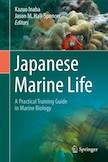 Professors Kazuo Inaba and Jason Hall-Spencer (University of Plymouth) published the first English-language book 'Japanese Marine Life - A Practical Training Guide in Marine Biology’ from Springer Nature. This book is aimed to be a marine biology textbook for increasing foreign students to Japan, as well as introducing Japanese marine fauna and flora to students and researchers in marine biology. Teaching staff of SMRC, as well as marine biologists in Japanese marine stations, participate in this book as authors.
Professors Kazuo Inaba and Jason Hall-Spencer (University of Plymouth) published the first English-language book 'Japanese Marine Life - A Practical Training Guide in Marine Biology’ from Springer Nature. This book is aimed to be a marine biology textbook for increasing foreign students to Japan, as well as introducing Japanese marine fauna and flora to students and researchers in marine biology. Teaching staff of SMRC, as well as marine biologists in Japanese marine stations, participate in this book as authors.
⇒ Japanese Marine Life - A Practical Training Guide in Marine Biology- April 27th, 2020
- Newspapers from around Japan covered the research on going around Izu and at the Shikine CO2 seep.
- April 21st, 2020
 In collaboration with researchers from the Universities of Palermo (Italy) and Plymouth (UK), Assist. Prof Sylvain Agostini, Assist. Prof. Ben Harvey, Assist. Prof. Shigeki Wada and Prof. Kazuo Inaba, recently published their research in the journal "Science of the Total Environment" on the effect of ocean acidification on corals and macroalgae and the cascading effects on the fish communities. The surveys conducted at the CO2 seep off the shore of Shikine Island, showed that increasing levels of CO2 lead to the loss of corals and macroalgae and an increase in turf algae. This shift from complex reefs to habitats dominated by opportunistic low-profile algae led to a 45% decrease of fish diversity, with a loss of coral-associated species and a rearrangement of feeding behaviour.
In collaboration with researchers from the Universities of Palermo (Italy) and Plymouth (UK), Assist. Prof Sylvain Agostini, Assist. Prof. Ben Harvey, Assist. Prof. Shigeki Wada and Prof. Kazuo Inaba, recently published their research in the journal "Science of the Total Environment" on the effect of ocean acidification on corals and macroalgae and the cascading effects on the fish communities. The surveys conducted at the CO2 seep off the shore of Shikine Island, showed that increasing levels of CO2 lead to the loss of corals and macroalgae and an increase in turf algae. This shift from complex reefs to habitats dominated by opportunistic low-profile algae led to a 45% decrease of fish diversity, with a loss of coral-associated species and a rearrangement of feeding behaviour.
⇒Changes in fish communities due to benthic habitat shift under ocean acidification condition." Science of the Total Environment
⇒ University of Tsukuba research topics
- March 31st, 2020
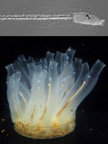 Prof. Yasunori Sasakura, his colleagues and collaborators demonstrate that neurotransmitter GABA is a key regulator of metamorphosis in the ascidian Ciona. This study was on-line published in the journal Current Biology on March 26, 2020.
Prof. Yasunori Sasakura, his colleagues and collaborators demonstrate that neurotransmitter GABA is a key regulator of metamorphosis in the ascidian Ciona. This study was on-line published in the journal Current Biology on March 26, 2020.
⇒"GABA-Induced GnRH Release Triggers Chordate Metamorphosis" Current Biology
⇒ University of Tsukuba research topics
- March 25th, 2020
 Kei Jokura (a PhD student, Inaba lab, SMRC) was awarded the Presidents Award for his academic and research performance during his PhD course.
Kei Jokura (a PhD student, Inaba lab, SMRC) was awarded the Presidents Award for his academic and research performance during his PhD course.
- February 27th, 2020
 Prof. Jason Hall-Spencer gave an evening lecture on the ocean acidification at the Linnean Society of London, a historical well-renowned society in the world. The Society once had a fellow Charles Darwin and the first female President Irene Manton.
Prof. Jason Hall-Spencer gave an evening lecture on the ocean acidification at the Linnean Society of London, a historical well-renowned society in the world. The Society once had a fellow Charles Darwin and the first female President Irene Manton.
- October 16th, 2019
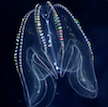 Kei Jokura, a PhD student, Dr. Daisuke Shibata, former Postdoctoral Fellow, Assistant Prof. Kogiku Shiba and Prof. Kazuo Inaba at the Shimoda Marine Research Center, University of Tsukuba found a novel protein involved in the formation of the comb plate in ctenophore. This work was carried out in collaboration with a research group at the National Institute for Basic Biology. These results were published online in Current Biology.
Kei Jokura, a PhD student, Dr. Daisuke Shibata, former Postdoctoral Fellow, Assistant Prof. Kogiku Shiba and Prof. Kazuo Inaba at the Shimoda Marine Research Center, University of Tsukuba found a novel protein involved in the formation of the comb plate in ctenophore. This work was carried out in collaboration with a research group at the National Institute for Basic Biology. These results were published online in Current Biology.
⇒"CTENO64 is required for coordinated paddling of ciliary comb plate in ctenophores" Current Biology- September 26th, 2019
 Junko Yaguchi (JSPS Research Fellowship for Young Scientists) was awarded Encouragement Award for Women Scientists (OM Award) from the Zoological Society of Japan for her work on ‘The relationship between the brain and enteric nervous system and its evolution’.
Junko Yaguchi (JSPS Research Fellowship for Young Scientists) was awarded Encouragement Award for Women Scientists (OM Award) from the Zoological Society of Japan for her work on ‘The relationship between the brain and enteric nervous system and its evolution’.
- September 25th, 2019
 At the 90th Annual Meeting of the Zoological Society of Japan, held in Osaka, Japan, Takeo Horie (Assistant Professor) was awarded the Young Scientist Initiative Award from the Zoological Society of Japan for his work on 'Research on the neural circuit development and function of ascidian larvae'.
At the 90th Annual Meeting of the Zoological Society of Japan, held in Osaka, Japan, Takeo Horie (Assistant Professor) was awarded the Young Scientist Initiative Award from the Zoological Society of Japan for his work on 'Research on the neural circuit development and function of ascidian larvae'.
- Jun 25th, 2019
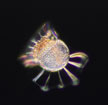 Dr. Mami Nomura (Former Postdoctoral Fellow), Assistant Prof. Kogiku Shiba and Prof. Kazuo Inaba at Shimoda Marine Research Center, University of Tsukuba discovered a cryptic cyanobacterial lineage with a worldwide distribution by single-cell genomics in collaboration with Assistant Prof. Takuro Nakayama and his research group at Tohoku university. These results were published online in Proceedings of the National Academy of Sciences of the United States of America (PNAS).
Dr. Mami Nomura (Former Postdoctoral Fellow), Assistant Prof. Kogiku Shiba and Prof. Kazuo Inaba at Shimoda Marine Research Center, University of Tsukuba discovered a cryptic cyanobacterial lineage with a worldwide distribution by single-cell genomics in collaboration with Assistant Prof. Takuro Nakayama and his research group at Tohoku university. These results were published online in Proceedings of the National Academy of Sciences of the United States of America (PNAS).
⇒Single-cell genomics unveiled a cryptic cyanobacterial lineage with a worldwide distribution hidden by a dinoflagellate host
⇒ University of Tsukuba news article (in Japanese)
- Jun 21st, 2019
 Assistant Prof. Kogiku Shiba and Prof. Kazuo Inaba at Shimoda Marine Research Center, University of Tsukuba revealed that an axonemal protein, calaxin is involved with ciliopathy in collaboration with research group at National Center for Child Health and Development, Meiji University, Osaka University, The University of Tokyo, Aichi University of Education and National Institute for Basic Biology. These results were published online in Communications Biology.
Assistant Prof. Kogiku Shiba and Prof. Kazuo Inaba at Shimoda Marine Research Center, University of Tsukuba revealed that an axonemal protein, calaxin is involved with ciliopathy in collaboration with research group at National Center for Child Health and Development, Meiji University, Osaka University, The University of Tokyo, Aichi University of Education and National Institute for Basic Biology. These results were published online in Communications Biology.
⇒”Calaxin is required for cilia-driven determination of vertebrate laterality” Communications Biology
⇒ University of Tsukuba news article (in Japanese)
- May 29th, 2019
 An international research group including associate professor Hiroaki Nakano at Shimoda Marine Research Center, University of Tsukuba, has shown that the Xenacoelomorpha, composed of marine invertebrate worms Acoelmorpha and Xenoturbella, is a sister group to the Ambulacraria (echinoderms and hemichordates). This result is now available online at Current Biology.
An international research group including associate professor Hiroaki Nakano at Shimoda Marine Research Center, University of Tsukuba, has shown that the Xenacoelomorpha, composed of marine invertebrate worms Acoelmorpha and Xenoturbella, is a sister group to the Ambulacraria (echinoderms and hemichordates). This result is now available online at Current Biology.
⇒ Mitigating Anticipated Effects of Systematic Errors Supports Sister-Group Relationship between Xenacoelomorpha and Ambulacraria
⇒ University of Tsukuba news article (in Japanese)
- April 26th, 2019
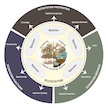 Prof. Jason Hall-Spencer and Assistant Prof. Ben Harvey at the Shimoda Marine Research Center, University of Tsukuba, revealed that ocean acidification could have broad reaching effects on ecosystems and the services they provide. Their new study provides a synthesis of the likely effects of ocean acidification on ecosystem properties, functions and services and is based on laboratory experiments and observations along natural gradients in CO2.
Prof. Jason Hall-Spencer and Assistant Prof. Ben Harvey at the Shimoda Marine Research Center, University of Tsukuba, revealed that ocean acidification could have broad reaching effects on ecosystems and the services they provide. Their new study provides a synthesis of the likely effects of ocean acidification on ecosystem properties, functions and services and is based on laboratory experiments and observations along natural gradients in CO2.
This result is now online at Emerging Topics in Life Sciences
⇒Ocean acidification impacts on coastal ecosystem services due to habitat degradation
- March 25th, 2019
- Haruka Suzuki, a graduate student in the developmental biology lab (Yaguchi lab), was awarded the chair’s awards from the Graduate School of Life and Environmental Sciences, University of Tsukuba, and from Biological Science, University of Tsukuba. The title of her master’s thesis is “Seeking for the determinants of left-right asymmetry of sea urchin embryos”.
⇒ Yaguchi lab where he conducted his research - March 17th, 2019
 Morihiko Tomatsuri, a graduate student at the Center, was awarded the Best Poster’s Award at the 66 Annual Meeting of the Ecological Society of Japan. His poster was entitled 'The effect of ocean acidification on hermit crab communities'
Morihiko Tomatsuri, a graduate student at the Center, was awarded the Best Poster’s Award at the 66 Annual Meeting of the Ecological Society of Japan. His poster was entitled 'The effect of ocean acidification on hermit crab communities'
⇒ Kon lab where he conducted his research- March 9th, 2019
 Masashi Asai, a graduate student at the Center, was awarded the Best Poster Award at the The 71st Annual Meeting of the Zoological Society of Japan Kanto Branch. His poster was entitled 'Morphological observations and phylogenetic analysis of Acoelomorpha collected at Shimoda'
Masashi Asai, a graduate student at the Center, was awarded the Best Poster Award at the The 71st Annual Meeting of the Zoological Society of Japan Kanto Branch. His poster was entitled 'Morphological observations and phylogenetic analysis of Acoelomorpha collected at Shimoda'
⇒ Nakano lab where he conducted his research- March 5th, 2019
 Assistant Prof. Ben Harvey at the Shimoda Marine Research Center, University of Tsukuba, along with co-authors, revealed that climate change will continue to increase the frequency of marine heatwaves and the associated impacts on marine biology could have broad reaching effects on ecosystems and the services they provide. This results is now online at Nature Climate Change
Assistant Prof. Ben Harvey at the Shimoda Marine Research Center, University of Tsukuba, along with co-authors, revealed that climate change will continue to increase the frequency of marine heatwaves and the associated impacts on marine biology could have broad reaching effects on ecosystems and the services they provide. This results is now online at Nature Climate Change
⇒ Marine heatwaves threaten global biodiversity and the provision of ecosystem services
⇒ Universty of Tsukuba news article (in Japanese)- March 5th, 2019
 Associate Prof. Shunsuke Yaguchi and JSPS Post-doctoral fellow Junko Yaguchi in Shimoda Marine Research Center, Universtiy of Tsukuba, revealed that the pylorus of sea urchin larvae is regulated by nitric oxide released from the endoderm-derived neuron-like cells. This results is now online in Proceedings of the National Academy of Sciences of the United States of America (PNAS)
Associate Prof. Shunsuke Yaguchi and JSPS Post-doctoral fellow Junko Yaguchi in Shimoda Marine Research Center, Universtiy of Tsukuba, revealed that the pylorus of sea urchin larvae is regulated by nitric oxide released from the endoderm-derived neuron-like cells. This results is now online in Proceedings of the National Academy of Sciences of the United States of America (PNAS)
⇒ Evolution of nitric oxide regulation of gut function
⇒ Universty of Tsukuba news article (in Japanese)- December 9th, 2018
 Kogiku Shiba (Assistant Professor) was awarded the Young Scientist Initiative Award from the Zoological Society of Japan for her work on ‘Elucidating the mechanism of flagellar and ciliary movement using a novel method of visualization and imaging'.
Kogiku Shiba (Assistant Professor) was awarded the Young Scientist Initiative Award from the Zoological Society of Japan for her work on ‘Elucidating the mechanism of flagellar and ciliary movement using a novel method of visualization and imaging'.
- October 15th, 2018
 Kei Jokura, a PhD student in Inaba lab. at Shimoda Marine Research Center, was awarded the Student Presentation Awards for his presentation in The 56th annual meeting of the Biophysical Society of Japan. The title of his presentation was "Identification of a novel protein CTENO64 in giant compound cilia in the ctenophore and its role in the coordinated ciliary movement".
Kei Jokura, a PhD student in Inaba lab. at Shimoda Marine Research Center, was awarded the Student Presentation Awards for his presentation in The 56th annual meeting of the Biophysical Society of Japan. The title of his presentation was "Identification of a novel protein CTENO64 in giant compound cilia in the ctenophore and its role in the coordinated ciliary movement".
- September 21st, 2018
 Research group of assistant Prof. Takeo Horie and Prof/Director Yasunori Sasakura, in collaboration with research group at Princeton University, University of Hyogo, Konan University, Okinawa Institute of of Science and Technology Graduate School, reported identification of regulatory cocktail for dopaminergic neurons differentiations in ascidians. These results were published in Genes and Development.
Research group of assistant Prof. Takeo Horie and Prof/Director Yasunori Sasakura, in collaboration with research group at Princeton University, University of Hyogo, Konan University, Okinawa Institute of of Science and Technology Graduate School, reported identification of regulatory cocktail for dopaminergic neurons differentiations in ascidians. These results were published in Genes and Development.
⇒ Regulatory cocktail for dopaminergic neurons in a protovertebrate identified by whole-embryo single-cell transcriptomics
⇒ Universty of Tsukuba news article (in Japanese)
⇒ more



